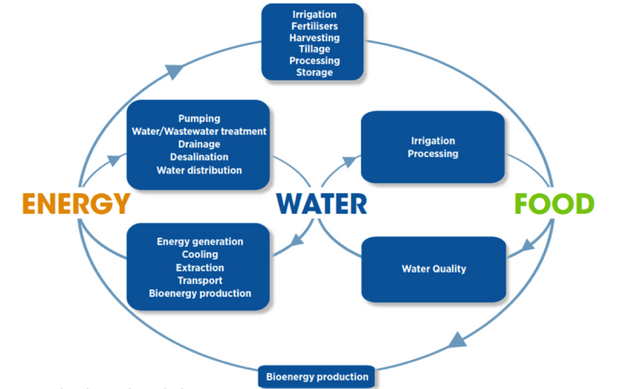A Convoluted Interdependence Between Water, food & energy
htm
Source:https://wocatpedia.net/index.php/Water,_energy_and_food_nexus![nexus2.png]
In Current trends today, we noticed that the rapid increase in the population of the world has put an increasing demand on basic resources that contributes to healthy living and an operative ecosystem.
Water resources has always been the primal matter for having sustainable energy and food securities. Therfore the pressure and lack of conscious stewardship of our water resources is currently affecting the availability of food and energy, making the ecosystem unsettled.
THE STRESS ON OUR WATER RESOURCES:
The sequence of both natural occurring conditions and humanity's actions creates pressure on our water resources. Climate change and natural variability in distribution of water are the natural driving force that muddle the sustainable development of our water resources.
Some of the changes affecting water resources in Africa includes:
- Pollution from industrial, municipal and agricultural sources
- Population growth, particularly in regions with water shortage.
- High demands for food security and socio-economic well being.
THE PIVOT ROLE OF WATER AND ITS SYNERGY WITH ENERGY AND AGRICULTURE.
Based on researches, we have seen numerous and substantial cooperation among water, energy and food production and their resultant impact on our environment. To footnote a few, lets consider this:
( )
)
Source: http://futureearth.org/future-earth-water-energy-food-nexus
Water is used for extraction, mining, processing, refining, and residue disposal of fossil fuels, as well as for growing feedstock for biofuels and for generating electricity. Water intensity varies in the energy sector, with oil and gas production requiring much less water than oil from tar sands or biofuels. Choosing biofuels for energy production should require a careful balancing of priorities, since water that has been used to grow feedstock for biofuels could also have been used to grow food.
Many forms of energy production through fossil fuels are highly polluting in addition to being water intensive, especially extraction from tar sands and shale and extraction through hydraulic fracturing. Further, return flows from power plants to rivers are warmer than the water that was taken in and/or are highly polluted and can consequently compromise other downstream usage, including ecosystems.
Conversely, energy is needed for extracting, transporting, distributing and treating water. Energy intensity for accessing a cubic meter of water varies: logically, accessing local surface water requires far less energy than pumping groundwater, reclaiming wastewater or desalinating seawater. Irrigation is more energy intensive than rain-fed agriculture, and drip irrigation is more intensive yet since the water must be pressurized.
Food production is by far the largest consumer of global fresh water supplies. Globally, agriculture is responsible for an average of 70% of fresh water consumption by humans; in some countries that figure jumps to 80%-90%.
Agriculture is therefore also responsible for much of fresh water over-exploitation. Food production further impacts the water sector through land degradation, changes in runoff, disruption of groundwater discharge, water quality and availability of water and land for other purposes such as natural habitat.
The increased yields that have resulted from mechanization and other modern measures have come at a high energy price, as the full food and supply chain claims approximately 30% of total global energy demand. Energy fuels land preparation, fertilizer production, irrigation and the sowing, harvesting and transportation of crops. The links between food and energy have become quite apparent in recent years as increases in the price of oil lead very quickly to increases in the price of food.
The energy sector can have other negative impacts on the food sector when mining for fossil fuels and deforestation for biofuel reduce land for agriculture, ecosystems and other uses.
The role of water in energy and food production cannot be over emphasized therefore the need to conserve and preserve water is eminent.
We can conserve and protect ground water by doing the following:
- Limit the amount of fertilizers used on plant.
- Take used motor oil to a recycling center.
- Run full loads of dishes and laundry and shut water off while brushing.
- Check for leaking faucets and have them fixed.
- Constantly get involved in water education.
Nuggets: Groundwater is the most important source of water, it is available in limited quantities and nothing works without it......So lets protect it!
REFERENCES:
- https://en.wikipedia.org/wiki/Water,_energy_and_food_security_nexus
- http://www.wdhopperwaterwells.com/protecting_our_water.php
- https://www.greenfacts.org/en/water-resources/l-3/1-pressures-on-ressources.

